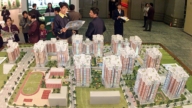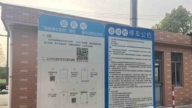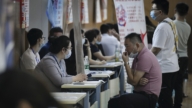【新唐人2011年9月20日訊】大陸農民工約有2億7千萬人,根據中國戶籍政策,這些農民工在城市無法平等的獲得教育、醫療和各項服務,使他們淪為二等公民。廣東新出臺的戶籍政策,採積分方式,不過相關政策傾向有大學學歷和財富的人群,農民工的反映普遍不佳,認為是個失敗的政策。
從1985年起,中國大批農民工湧入城市和製造業中心。然而,中國的戶籍制度將中國公民分為城市居民和農村居民,農民工在這樣的制度下無法享有城市各項福利,儘管新的政策出臺,大城市不願向所有人開放戶口,在有限的名額中標準也就越嚴苛。
對於新的政策,派出所戶籍員李先生表示,限制這些對城市建設最有貢獻的農民工入戶,非常不公平也不合理。
戶籍員李先生:「到城市來,講的好聽,甚麼學歷啊,甚麼甚麼要求甚麼各方面能力,那麼人生來平等,為甚麼一定要搞這些東西才能到城市來呢,對不對?他有錢買一張火車票就能來嘛,他能在這裡生活就應該讓他留下來嘛,他在這裡工作幫助把這城市建設,這城市各方面的需求,甚至城市為甚麼這麼興旺就是靠這麼多人來這裡消費。」
6月7號,廣東出臺農民工積分制入戶城鎮工作的指導意見,在廣東省城鎮務工的農村勞動力,凡已辦理《廣東省居住證》、納入就業登記、繳納社會保險的,可以申請納入積分登記。原則上農民工積滿60分可以申請入戶,配偶和未成年子女可以隨遷。不過真正要在廣州落戶至少要達到130分。
在廣州當地,企業投資500萬元,就可獲得20分,擁有房產者,也可得20分。18歲到35歲,攻讀大學學位或擁有廣東農村戶口者可獲得更多積分。
農民工孫二代表示,500萬獲20分的門檻太高了,一般農民工沒有這樣的財力。農民工梁女士也認為這樣的標準,很多人根本是入不了戶。
梁女士:「他這個門檻太高,作秀,我認為他是作秀。」
另外,繳納社會保險費也可積分。參加養老保險、城鎮基本醫療保險、失業保險、工傷保險等,每個險種滿一年積1分,總分不超50分。另外,獻血或做義工也是加分的途徑。
孫二代:「表面上它(積分)體現出了一種公平的原則,雖然暗地裡可能它會有很多潛規則,就是說各種方面的數據,在加分的數據他都可以造假,都可以作出一些改變。」
除了積分,還有扣分指標,有超生行為,五年內不能申請入戶,期限屆滿之後,超生一個子女扣100分,此外,受過勞動教養的扣50分,受過刑事處罰者扣100分。
李先生表示,農民工非常憎恨這種人為的分等級制度,因為他們比城市人更加辛苦幹活,城市人不願幹的活都是他們幹的,但是他們得到的報酬卻僅僅只能餬口。
新唐人記者朱智善、李庭、李月採訪報導。
New Household Registration’s Point System
There are approximately 270 million migrant workers
in China. According to China’s household registration policy,
these migrant workers do not have equal access to
education, health care and other services,
and thus become second class citizens.
Guangdong Province recently introduced a new household
registration policy that uses a point system.
Nonetheless, the policy favors wealthy individuals
and people who have university level education.
Migrant workers believe this is a failed policy.
Since 1985, a large number of migrant workers
flooded into cities and manufacturing centers.
China’s household registration system classifies
Chinese citizens into urban citizens and rural citizens.
Migrant workers cannot enjoy the welfare benefits as urban
residents do.
Despite the introduction of a new household registration policy,
major cities are not willing to open household registrations to all people.
The criteria for registration are more stringent.
Household register worker Mr Li said that it is unfair that
the new policy restricts the migrant workers who make the most contributions to the city.
Mr Li: “In order to move to the city, you need to have
education and other capabilities. People are equal.
Why do you need all this in order to come to the city?
If he has money to buy a train ticket, then let him come.
If he has the ability to live here, then let him stay.
His working here helps the construction of the city.
The city is thriving because so many people
come here to consume.”
On June 7, Guangdong Province introduced a new policy
that allows migrant workers to accumulate points and apply for urban household registration.
Rural labor force, who have applied for Guangdong
Residency, registered for employment, and paid Social Security, are eligible to apply for register points.
In principle, workers who have accumulated 60 points
are eligible to apply for household registration, and their spouse and children can move with the applicants.
However, in reality, you need at least 130 points in order to
receive residency in Guangzhou city.
In Guangzhou city, you can gain 20 points if you invest
RMB 5 million in local businesses.
You can also gain 20 points if you own property. Applicants
aged between 18 and 35 who have a university degree
or rural household residency in Guangdong Province
can also gain more points.
Migrant worker Sun Erdai believes the requirement
of RMB 5 million is too high, ordinary migrant workers do not have such money.
Another migrant worker, Ms Liang, said that
if the requirement is set too high, most migrant workers will not be eligible to apply.
Ms Liang: “The bar is too high.
I think they are putting on a show.”
Applicants can also gain points by paying social security.
Purchase of pension, basic urban medical insurance, unemployment insurance and injury insurance also add points.
You gain one point for purchase of each type of insurance
for one year, with a cap of 50 points. Blood donations and volunteering is another way to gain points.
Sun Erdai: “The point system seems fair on the surface,
But there are hidden rules.
They can fabricate many aspects of the data.
They can also make changes to the points.”
Besides point accumulation, there is a demerit point system.
If you have children over the quota, you are not allowed to apply for registration within five years.
After five years, 100 points are deducted for giving birth
to each child over the quota.
50 points are deducted if you have been reeducated
through forced labor, and 100 points are deducted if you have criminal charges.
Mr Li said that migrant workers hate this artificial class
system, because they work harder than urban workers,
and they are willing to do work that urban workers are not,
yet they only get paid just enough to make ends meet.
NTD reporters Zhu Zhishan, Li Ting and Li Yue






























